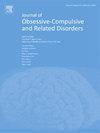Symptom accommodation in obsessive-compulsive and major depression disorder: Effects on relationship quality
IF 1.5
4区 医学
Q3 PSYCHIATRY
Journal of Obsessive-Compulsive and Related Disorders
Pub Date : 2025-03-08
DOI:10.1016/j.jocrd.2025.100950
引用次数: 0
Abstract
Accommodation processes often sustain the disorder and affect the relationship between patients and their close others. However, the current evidence on the interplay between accommodation behaviour (AB) and relationships is contradictory, partly because studies usually consider either the patient or the relative. The present study addresses this gap by examining the association between AB and various relationship aspects in 50 dyads, consisting of 25 patients with obsessive-compulsive disorder (OCD) or 25 patients with major depression (MDD) and their respective close others. After the dyads recalled a shared disorder-specific emotional experience, they responded to various questionnaires assessing family accommodation, OCD symptoms, depression, relationship satisfaction, subjective closeness, and conflict frequency based on an individually described relationship context. The results of the actor-partner interdependence models point to similarities and disorder-specific differences. For both groups, AB represents a challenge in the relationship. Although AB is associated with more frequent conflict, lower subjective closeness, and lower relationship satisfaction in dyads with OCD and close others of MDD, patients with MDD are more likely to experience AB as supportive. This suggests differences in the functionality of AB across various disorders, with potential disorder-maintaining effects in both OCD and MDD. Clinically, the results highlight the importance of interventions targeting interpersonal dynamics, such as family therapy and psychoeducation, to balance support while reducing symptom-maintaining behaviours. Future research should explore tailored interventions to optimize relationship functioning while minimizing the negative effects of AB.
强迫症和重度抑郁症的症状适应:对关系质量的影响
适应过程往往会使这种障碍持续下去,并影响患者与其亲近的人之间的关系。然而,目前关于适应行为(AB)和人际关系之间相互作用的证据是矛盾的,部分原因是研究通常只考虑患者或亲属。本研究通过对50对(包括25名强迫症(OCD)患者或25名重度抑郁症(MDD)患者及其近亲)的AB与各种关系方面的关联进行研究,解决了这一差距。在二人回忆起共同的障碍特定情感经历后,他们回答了各种问卷,评估家庭适应、强迫症症状、抑郁、关系满意度、主观亲密度和基于个人描述的关系背景的冲突频率。行为者-伙伴相互依赖模型的结果指出了相似性和特定障碍的差异。对于两组人来说,AB代表着关系中的一个挑战。虽然AB与更频繁的冲突、较低的主观亲密度和较低的关系满意度有关,但患有重度抑郁症的患者更有可能将AB视为支持性的。这表明AB在各种疾病中的功能存在差异,在强迫症和重度抑郁症中都具有潜在的疾病维持作用。在临床上,研究结果强调了针对人际动态的干预措施的重要性,如家庭治疗和心理教育,以平衡支持,同时减少维持症状的行为。未来的研究应该探索量身定制的干预措施,以优化关系功能,同时最大限度地减少AB的负面影响。
本文章由计算机程序翻译,如有差异,请以英文原文为准。
求助全文
约1分钟内获得全文
求助全文
来源期刊
CiteScore
4.00
自引率
5.60%
发文量
46
审稿时长
47 days
期刊介绍:
Journal of Obsessive-Compulsive and Related Disorders (JOCRD) is an international journal that publishes high quality research and clinically-oriented articles dealing with all aspects of obsessive-compulsive disorder (OCD) and related conditions (OC spectrum disorders; e.g., trichotillomania, hoarding, body dysmorphic disorder). The journal invites studies of clinical and non-clinical (i.e., student) samples of all age groups from the fields of psychiatry, psychology, neuroscience, and other medical and health sciences. The journal''s broad focus encompasses classification, assessment, psychological and psychiatric treatment, prevention, psychopathology, neurobiology and genetics. Clinical reports (descriptions of innovative treatment methods) and book reviews on all aspects of OCD-related disorders will be considered, as will theoretical and review articles that make valuable contributions.
Suitable topics for manuscripts include:
-The boundaries of OCD and relationships with OC spectrum disorders
-Validation of assessments of obsessive-compulsive and related phenomena
-OCD symptoms in diverse social and cultural contexts
-Studies of neurobiological and genetic factors in OCD and related conditions
-Experimental and descriptive psychopathology and epidemiological studies
-Studies on relationships among cognitive and behavioral variables in OCD and related disorders
-Interpersonal aspects of OCD and related disorders
-Evaluation of psychological and psychiatric treatment and prevention programs, and predictors of outcome.

 求助内容:
求助内容: 应助结果提醒方式:
应助结果提醒方式:


